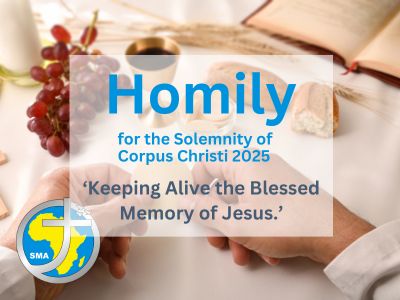Readings: Genesis 14:18-20; 1 Corinthians 11:23-26; Luke 9: 11b-17.
Theme: Keeping Alive the Blessed Memory of Jesus
By Michael McCabe SMA
Today, the feast of Corpus Christi (the Body of Christ) celebrates the permanent presence of Christ in the great sacrament of the Eucharist. In the Eucharist, Christ is present in many ways: in the community who have come to celebrate, in his word proclaimed, but, above all, in the bread and wine transformed into his body and blood shared among us. Since the Middle Ages this day has been marked by processions in which the consecrated host is carried out of the church in a monstrance and processed through the streets of the town or village, showing that the Word made flesh is not just in a box labelled ‘church’ but in our midst, just as he was on the streets of Nazareth and Jerusalem.
During his life on earth, Jesus’ favourite way of expressing his love for, and his desire to be one with people, especially for those who were rejected and unloved, was to share meals with them. Today’s gospel reading from Luke recounts the familiar story of how Jesus miraculously provided a great meal for a huge crowd of people who came to listen to him and be healed by him. Shared meals were, for the Jews, signs of acceptance and friendship. Like many people, the Jews were rather selective about those with whom they shared meals. In seeking out public sinners and tax collectors, Jesus was going against their traditions. Most Jews invited their friends or powerful people to their meals. In eating with sinners, Jesus was making friends with those who had no friends. He was showing them respect and love. He was letting them see themselves in a new light and become a new people. Instead of being nobodies, people with no hope, no future, they were God’s beloved children and citizens of his Kingdom. Something they had never even dreamed of had become a reality The Kingdom of God was not meant just for the religious elite. It was also for them.
It should come as no surprise to us that Jesus’ last act before his death on the Cross was to share a meal with his disciples – his Last Supper. The Eucharist is the memorial of the Last Supper. Jesus’ last act before his death on the Cross was to share a meal with those he had chosen – his Last Supper. In the course of this meal, as St Paul reminds us in today’s first reading, ‘the Lord Jesus took some bread, and when he had given thanks, he broke it, and said, “This is my body, which is for you. Do this in remembrance of me.” In the same way he took the cup after supper, and said, “This Cup is the new covenant in my blood. Whenever you drink it, do this in remembrance of me”’ (1 Cor 11:24-25).
Jesus’ last meal with his disciples is inseparable from the sacrifice of his life on the Cross, his supreme act of love. Love is manifested supremely in self-sacrifice. ‘Greater love has no one than this: to lay down one’s life for one’s friends’ (Jn 15:13). In celebrating the Eucharist, we celebrate the memory of Jesus’ passion and death. As St Paul reminds us, ‘Therefore, every time you eat this bread and drink this cup, you are proclaiming his death’ (1 Cor 11:26). We also recall the events which led to his death, the values by which he lived, and for which he died, and we commit ourselves to live by those same values: his passion for a world re-fashioned in the image of a loving God; his compassion for the poor and outcast; his mercy for, and forgiveness of, sinners; his hatred of hypocrisy; his abhorrence of violence and his commitment to peace.
In receiving the body and blood of Christ in the Eucharist, we become one, not only with Jesus, but with one another. This recognition of the oneness of all who partake of the Body and Blood of Christ is expressed in several ways throughout the Mass: the common acknowledgement that we are sinners; the common responses; the songs of praise; the Gloria; the Creed; the Acclamation of Faith; the Great Amen; and the kiss of Peace [unfortunately in abeyance since the outbreak of the Covid pandemic]. When St Augustine preached to his assembled congregation on the meaning of the Eucharist, he told them: ‘See what you are and become what you see: the Body of Christ… You are saying “Amen” to what you are: your response is a personal signature, affirming your faith. … Be a member of Christ’s body, then, so that your “Amen” may ring true!’
Every Eucharist ends with a sending on Mission: ‘Go in Peace to love and serve the Lord’. We are commissioned to bring the message of the Eucharist to the world. Just as the Jesus has become our Food, giving himself completely to us, so we, too, must give ourselves for the sake of the world. Our celebration of the this great feast of Corpus Christi reminds us of our constant challenge: to keep alive the blessed memory of Jesus by becoming, in the context of our time, his flesh and blood given for the life of the world. So we pray: ‘Lord, we thank you for the gift of your Body and Blood through which we are nourished and strengthened to share your love with our brothers and sisters. Amen.
Listen to an alternative audio Homily by Tom Casey:

